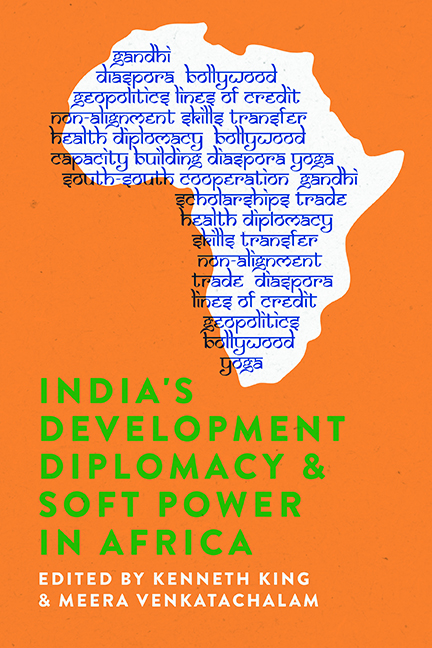Book contents
- Frontmatter
- Contents
- Notes on Contributors
- Acknowledgements
- List of Abbreviations
- Glossary
- Introduction: India–Africa Now: Changing Imaginaries and Knowledge Paradigms
- Part 1 The Geopolitical Imaginary and Soft Power
- Part 2 The Indian Political Right and the Reconfiguration of Soft Power in Africa
- Part 3 Capacity Building: Shifting Modalities and New Knowledgescapes
- Part 4 Skilling, Knowledge Transfer and Indo-African Interactions
- Conclusion: Reflections on India–Africa Studies, Development Cooperation and Soft Power
- Index
9 - The Trumpets and Travails of ‘South–South Cooperation’: African Students in India since the 1940s
Published online by Cambridge University Press: 26 May 2022
- Frontmatter
- Contents
- Notes on Contributors
- Acknowledgements
- List of Abbreviations
- Glossary
- Introduction: India–Africa Now: Changing Imaginaries and Knowledge Paradigms
- Part 1 The Geopolitical Imaginary and Soft Power
- Part 2 The Indian Political Right and the Reconfiguration of Soft Power in Africa
- Part 3 Capacity Building: Shifting Modalities and New Knowledgescapes
- Part 4 Skilling, Knowledge Transfer and Indo-African Interactions
- Conclusion: Reflections on India–Africa Studies, Development Cooperation and Soft Power
- Index
Summary
In his 1966 memoir, the Kenyan writer R. Mugo Gatheru recalled his time as a student in newly independent India. His stay at the University of Allahabad in 1949 on a recently created Indian Council for Cultural Relations (ICCR) scholarship was ‘a tremendous experience to me emotionally and psychologically. There, for the first time in my life, I felt a free man – free from passes or being pushed here and there as if I was an undesirable animal’ (Gatheru 1966: 130). Gatheru was in the first cohort of tens of thousands of Africans who would study in India over the next seventy years. Such opportunities signalled, framed and were the anti-colonial solidarities that characterised Indo-African relations under India's first Prime Minister, Jawaharlal Nehru, in the 1950s. This historical conviviality became repurposed under the rejuvenated ‘South–South cooperation’ of the India-Africa Forum Summits (IAFS) from 2008 onwards as India–Africa economic cooperation grew apace in the twenty-first century.
The presence of African students in India anchored the continuities – rhetorical and very real – of the united Indo-African community over the postcolonial period. It was also an era in which New Delhi argued for the consistency of its human resource-centred outreach to Africa. These were policies formed in deliberate contrast to former colonial and neo-colonial Western powers, who dealt in coercive ‘tied’ economic aid, and other emerging Asian donors, notably China, rolling out large infrastructure projects from the 1960s and with notable speed in the 2000s as competition for African exports, commercial opportunities and political alliances intensified. The assertion of moral exceptionalism in India's Africanist foreign policy became encapsulated in the frequently cited words of Mahatma Gandhi, who himself developed as a political thinker on African soil at the turn of the twentieth century. In 1946, he predicted that ‘the commerce between India and Africa will be of ideas and services, not of manufactured goods against raw materials after the fashion of the Western exploiters’ (Gandhi 1946: 282). Educational cooperation – the commerce of ideas – was a cornerstone of India's significant ideological and material commitment to African partners in the era of decolonisation. At the same time, this work buttressed India's self-proclaimed leadership within the ‘Third World’ and successor ‘Global South’.
- Type
- Chapter
- Information
- India's Development Diplomacy and Soft Power in Africa , pp. 169 - 184Publisher: Boydell & BrewerPrint publication year: 2021

